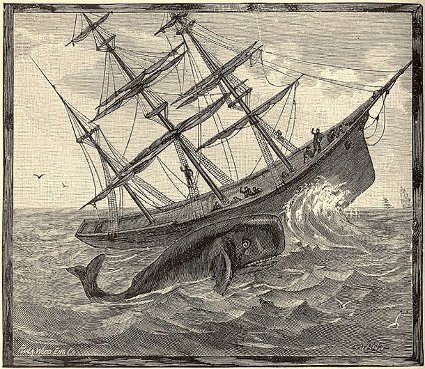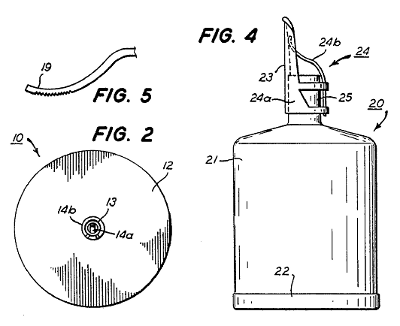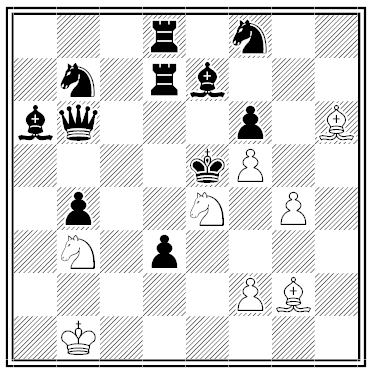“The image of myself which I try to create in my own mind in order that I may love myself is very different from the image which I try to create in the minds of others in order that they may love me.” — W.H. Auden
Author: Greg Ross
Divine Mystery
A poem on transubstantiation by Luis de León, quoted by Robert Southey in Letters Written During a Short Residence in Spain and Portugal:
If this we see be bread, how can it last,
So constantly consum’d, yet always here?
If this be God, then how can it appear
Bread to the eye, and seem bread to the taste?
If bread, why is it worshipp’d by the baker?
If God, can such a space a God comprise?
If bread, how is it, it confounds the wise?
If God, how is it that we eat our Maker?
If bread, what good can such a morsel do?
If God, how is it we divide it so?
If bread, such saving virtue could it give?
If God, how can I see and touch it thus?
If bread, how could it come from heav’n to us?
If God, how can I look at it and live?
Enough

On Nov. 20, 1820, the Nantucket whaler Essex was attacking a pod of sperm whales in the South Pacific when an immense 85-foot whale surfaced about 100 yards off the bow. It spouted two or three times, dove briefly, then charged and “struck the ship with his head just forward of the fore chains,” reported mate Owen Chase. “He gave us such an appalling and tremendous jar as nearly threw us all on our faces. The ship brought up as suddenly and violently as if she had struck a rock, and trembled for a few moments like a leaf. We looked at each other in perfect amazement, deprived almost of the power of speech.”
The whale passed under the ship and lay on the surface, stunned at first and then convulsing. Chase ordered men to the pumps and called back the boats, but as the Essex began to settle in the water a man called, “Here he is — he is making for us again.”
“I turned around, and saw him about one hundred rods directly ahead of us, coming down with apparently twice his ordinary speed, and to me it appeared with tenfold fury and vengeance in his aspect,” Chase wrote. “The surf flew in all directions, and his course towards us was marked by a white foam of a rod in width, which he made with a continual violent threshing of his tail.” The second blow stove in the Essex’s bows, and the whale “passed under the ship again, went off to leeward, and we saw no more of him.”
If this was vengeance, it was well accomplished. The Essex sank more than 1,000 miles from land; of the 21 crew who piled into three boats, only eight would survive, three on a barely habitable island and five after resorting to cannibalism during three months at sea. The whale acquired a further kind of immortality: Chase’s account of the disaster, written on his return to Massachusetts, helped inspire Herman Melville to write Moby-Dick.
Black and White
Midair
A “curious puzzle” from Raymond Smullyan:
Imagine a plane table of infinite extent. Attached perpendicularly to the table is a rod of finite length, and above that, attached by a hinge, is a second vertical rod, this one infinitely long.
Operate the hinge. What happens? The infinite rod descends freely through the first 90 degrees, until it’s parallel to the tabletop. But it can’t go beyond this, because then at some point the solid rod would intersect the solid table.
Thus it’s impossible to “rest” an infinite rod on an infinite plane. “And so, you have the curious phenomenon of the hinged rod being supported at only one end!”
Teamwork
LOGIC, n. The art of thinking and reasoning in strict accordance with the limitations and incapacities of the human misunderstanding. The basic of logic is the syllogism, consisting of a major and a minor premise and a conclusion–thus:
Major Premise: Sixty men can do a piece of work sixty times as quickly as one man.
Minor Premise: One man can dig a posthole in sixty seconds; therefore–
Conclusion: Sixty men can dig a posthole in one second.
This may be called the syllogism arithmetical, in which, by combining logic and mathematics, we obtain a double certainty and are twice blessed.
— Ambrose Bierce, The Devil’s Dictionary, 1911
In a Word
oblivescence
n. the process of forgetting
Mixed Call
Where in the Bible are we told in one verse not to do a thing and in the next to do it?
‘Answer not a fool according to his folly, lest thou also be like unto him.’ Prov. xxvi. 4.
‘Answer a fool according to his folly, lest he be wise in his own conceit.’ Prov. xxvi. 5.
— Samuel Grant Oliphant, Queer Questions and Ready Replies, 1887
Italian to Go

“[B]ecause of the nature of pasta dishes, it has not been practical to eat pasta products while strolling.” Patented in 1990, Nicholas Ruggieri’s “spaghetti sipper” solves this problem with a tidy, portable container:
A person eats the pasta by placing their mouth on the spout 23 or tube 13 and sucking up the pasta. When the desired amount of pasta is obtained, the person bites off the pasta and then consumes the pasta in the usual manner. When the pasta is cut, the pasta in the tube 13 or spout 23 is held in place by the pawl mechanism 14b, 24b. When the person wishes more pasta the sequence is repeated. By use of the pasta server 10, 20 of this invention a person can eat pasta while strolling and the like.
“To the pasta can be added as desired any of a number of sauces traditionally associated with pasta. These sauces typically enhance the lubricious properties of the pasta.”
Falling Angels
A fearful accident happened on Friday last at the Madeleine church, Bruges. One of the priests, while performing mass, was suddenly struck to the ground by the falling on his forehead of the marble head of an infant Jesus, which had become detached from its body. Fracture of the skull and a severe wound were the consequence to the unhappy clergyman, who, after lingering in great agony, died yesterday.
— Times, May 3, 1847
An extraordinary and fatal accident happened this morning in the Roman Catholic parish church of Kildare. As the Very Rev. Dr. J.B. Kavanagh, P.P., was standing in front of the altar with his hand on the chalice to raise it at the close of 7 o’clock mass, and was about to descend the altar steps to recite the Rosary and Litany of the blessed Virgin, the marble figure of a cherub over the altar fell down and struck him with great force on the head. He fell back heavily, murmured the words ‘My God’ twice, and then became insensible. A cry of horror and anguish was raised by the congregation who witnessed the accident. Some persons rushed forward to lift him up, while others ran for medical help. Drs. Watson, Dillon and Chaplin were soon in attendance, and Dr. Kavanagh having been raised from the floor was placed on a stretcher and carried into the adjoining convent, where, having never recovered consciousness, he died soon afterwards.
— Times, Oct. 6, 1886

